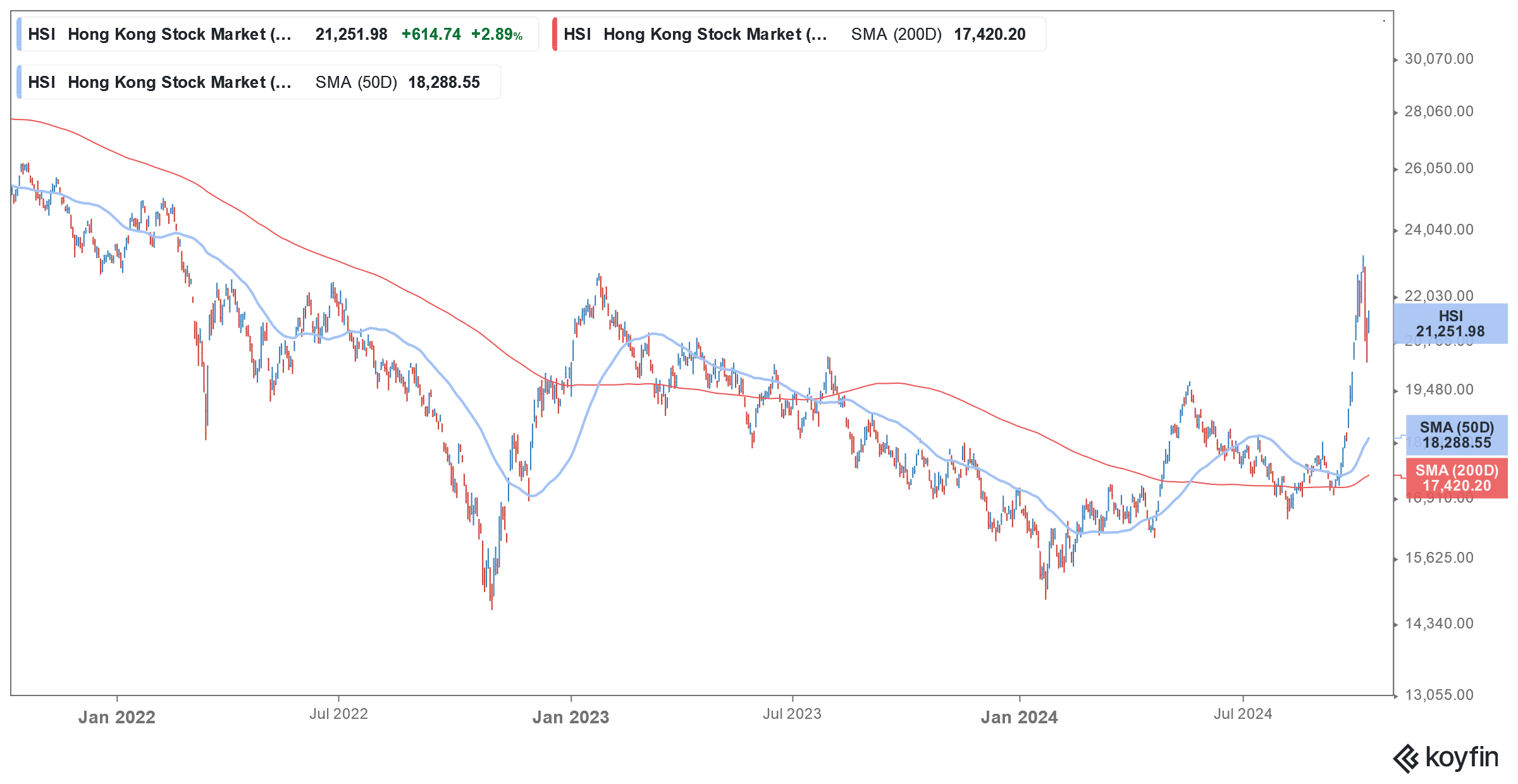China Promises More Fiscal Measures to Support Economy but Avoids Specifics
Please note that we are not authorised to provide any investment advice. The content on this page is for information purposes only.
Over the last three weeks, China has announced a flurry of fiscal and monetary policy measures. At his widely awaited press conference today, China’s Minister of Finance Lan Fo’an pledged more support for the economy but refrained from providing specifics on the size of the stimulus.
At his press conference, the Chinese finance minister outlined various policies to revive the world’s second-largest economy. The country will increase support for debt-laden local governments and also issue special treasury bonds which it would use to strengthen the capital of state-owned banks. Strengthening the balance sheet of state-owned banks would help them increase their lending.
China Announces More Fiscal Measures to Support It’s Slowing Economy
China would also help local governments stop the downturn in real estate by allowing them to issue special bonds for land purchases. It would also allow affordable housing subsidies – which were hitherto meant for new construction – to be used for existing housing inventory. The country is also considering cutting taxes on properties but did not specify what taxes it was looking to cut. The country would also increase the value of scholarships to help students.
Chinese Financial Minister Says There Is Enough Room for Fiscal Stimulus
At his press conference, Lan said that more stimulus measures are on the table and stressed, “There are other policy tools that are being discussed that are still in the pipeline.” He also sought to allay fears that China’s high debt leaves little scope for fiscal stimulus and emphasized that “there is still relatively big room for China to issue debt and increase the fiscal deficit.”
How Analysts Reacted to The Recent Stimulus from China
Zhiwei Zhang, president and chief economist at Pinpoint Asset Management said, “These policies are in the right direction.” He added, “The press conference didn’t give specific numbers on the fiscal stimulus. The key messages are that the central government has the capacity to issue more bonds and raise its fiscal deficit, and the central government plans to issue more bonds to help local governments to pay their debt.”
According to Zhang, “While the minister didn’t say explicitly that they will raise the fiscal deficit, I think his comments implies that it is possible the government will raise fiscal deficit above 3% for next year.
Meanwhile, while markets have largely welcomed the stimulus, most believe that China needs to do a lot more to revive its economy.
Huang Yan, investment manager at private fund company Shanghai Qiuyang Capital Co., Shanghai said, “The strength of the announced fiscal stimulus plan is weaker than expected. There’s no timetable, no amount, no details of how the money will be spent. The market had been expecting trillions of yuan in fresh stimulus … but the briefing gave little good news, and limited room for imagination.”
Analyst Warns That the Rally in China Stocks Could Lose Steam
He warned that the rally in China’s stock market could lose steam if the country does not come up with more fiscal policies.
Fred Neumann, Chief Asia economist at HSBC, Hong Kong said, “By loosening restrictions on local governments to purchase excess housing inventory, officials are offering more support to the battered housing markets. While helpful, this does not offer a quick fix in itself to stabilize the housing market.”
Neumann added, “By underlining their room for fiscal easing, officials are hinting that more could be done to support growth, but investors are left wondering how much extra money the government is willing to commit. For this, investors will need to be patient, with more concrete numbers likely to be unveiled at the end of the month, once the standing committee of the National People’s Congress has had an opportunity to review and vote on specific proposals.”
China Loosened Its Monetary Policy
Last month, People’s Bank of China (PBOC) Governor Pan Gongsheng announced that it will cut reserve requirement ratio (RRR) which is the cash banks need to have on hand by 50 basis points. While Pan did not spell out the timeline for the cut, he said that the Chinese central bank would cut the RRR by another 25-50 basis points by the end of the year. Pan also announced that the PBOC will cut the 7-day repo rate by 20 basis points.
Pan also announced a 0.2-0.25% cut in the loan prime rate could follow, without specifying whether it would be done for the one-year or five-year tenure. These measures would increase liquidity in the Chinese financial system.
China also announced multiple fiscal measures to support the ailing housing and banking sectors. It would provide cash handouts to the poor, increase child support, and ease property ownership rules.
Chinese Stocks Have Recovered
The flurry of measures helped propel both the mainland and Hong Kong-listed shares which had otherwise been underperforming global peers for years. Incidentally, the Hang Seng Index fell in the previous four years. It lost over half of its value erasing over $5 trillion in market cap. Earlier this year, the size of Hong Kong equity markets fell below the Indian stock market – thanks to the impressive gains in the latter over the previous couple of years.
Meanwhile, the stimulus measures triggered a 25% rally in the Hang Seng index and it rose to a two-year high. Real estate stocks were among the biggest winners amid expectations that the country is looking to support the ailing sector in a major way.






